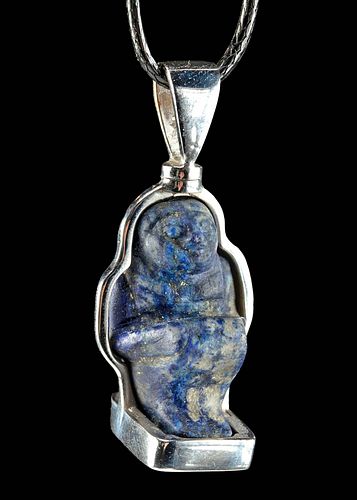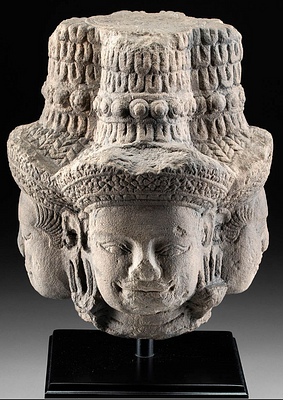Egyptian Lapis Amulet of Goddess Maat, Gold Pendant
Lot 24
About Seller
Artemis Fine Arts
686 S Taylor Ave, Ste 106
Louisville, CO 80027
United States
Selling antiquities, ancient and ethnographic art online since 1993, Artemis Gallery specializes in Classical Antiquities (Egyptian, Greek, Roman, Near Eastern), Asian, Pre-Columbian, African / Tribal / Oceanographic art. Our extensive inventory includes pottery, stone, metal, wood, glass and textil...Read more
Categories
Estimate:
$3,000 - $4,500
Absentee vs Live bid
Two ways to bid:
- Leave a max absentee bid and the platform will bid on your behalf up to your maximum bid during the live auction.
- Bid live during the auction and your bids will be submitted real-time to the auctioneer.
Bid Increments
| Price | Bid Increment |
|---|---|
| $0 | $25 |
| $300 | $50 |
| $1,000 | $100 |
| $2,000 | $250 |
| $5,000 | $500 |
| $10,000 | $1,000 |
| $20,000 | $2,500 |
| $50,000 | $5,000 |
| $100,000 | $10,000 |
| $200,000 | $20,000 |
About Auction
By Artemis Fine Arts
Jun 29, 2023
Set Reminder
2023-06-29 10:00:00
2023-06-29 10:00:00
America/New_York
Bidsquare
Bidsquare : Exceptional Antiquities, Ethnographic and Fine Art
https://www.bidsquare.com/auctions/artemis-gallery/exceptional-antiquities-ethnographic-and-fine-art-13031
Artemis Fine Arts info@artemisgallery.com
Artemis Fine Arts info@artemisgallery.com
- Lot Description
Late Dynastic Period, 26th Dynasty, ca. 664 to 525 BCE. A rare lapis lazuli pendant depicting the figural form of Maat, the goddess embodying the concepts of order, righteousness, and truth. Maat is more frequently referred to as a concept rather than as a physical deity, and her figural form is typically accompanied by the feather of truth (or feather of maat); examples from the Late Dynastic Period did not include this feather for ease of manufacturing. Maat is shown here squatting atop an integral plinth, knees extended over petite feet, while her expressive visage peers into the distance. The pendant is set within a modern 14K white gold setting for presentation and on a necklace cord for wearability! Size (pendant): 0.6" W x 1.05" H (1.5 cm x 2.7 cm); (setting): 0.72" W x 1.64" H (1.8 cm x 4.2 cm); (cord): 22" L (55.9 cm)
Maat is one of the oldest deities in the Egyptian pantheon and represents far more than simple black-and-white ideals. Egyptologist Carol Andrews explains how "Maat represents all kinds of abstract concepts, such as cosmic order, truth, justice and righteousness, personified as a squatting woman, her hands on her knees and single ostrich plume on her head . . . Contemporary examples in the round in Egyptian blue often lack the feather for manufacturing reasons." (Andrews, Carol. Amulets of Ancient Egypt. University of Texas Press, Austin, 1994, pp. 21-22). The ideal of maat was vital to the lives of ancient Egyptians as it not only defined how well an individual life should be lived but also created a sense of societal morality, a structure of norms by which the populace should abide if they are to meet each other again in the afterlife. Further, Egyptologist Garry J. Shaw explains: "The aim of every living being, from the gods to the pharaoh and mankind, was to ensure that order (maat) was not overtaken by disorder (isfet). To the Egyptians, maat permeated all things, and those who broke its laws were punished, whether they knew of them or not. The gods even lived on maat, referring to it as their beer, food and drink." (Shaw, Garry J. The Egyptian Myths: A Guide to the Ancient Gods and Legends. Thames & Hudson Ltd., London, 2014, p. 31)
Provenance: private Southern California, USA collection, bestowed 2006; ex-private Los Angeles, California, USA collection, acquired before 2006; ex-Hesperia Auction, New York, USA, November 27, 1990, Lot 25
All items legal to buy/sell under U.S. Statute covering cultural patrimony Code 2600, CHAPTER 14, and are guaranteed to be as described or your money back.
A Certificate of Authenticity will accompany all winning bids.
We ship worldwide and handle all shipping in-house for your convenience.
#175848Wearable as shown and constructed in modern times. Lapis lazuli amulet is ancient; necklace cord and white gold setting are modern. Amulet has minor abrasions and nicks commensurate with age, otherwise intact and excellent. Great preservation to figural form and finer details.Condition
- Shipping Info
-
All shipping is handled in-house for your convenience. Your invoice from Artemis Gallery will include shipping calculation instructions. If in doubt, please inquire BEFORE bidding for estimated shipping costs for individual items.
-
- Buyer's Premium



 EUR
EUR CAD
CAD AUD
AUD GBP
GBP MXN
MXN HKD
HKD CNY
CNY MYR
MYR SEK
SEK SGD
SGD CHF
CHF THB
THB













